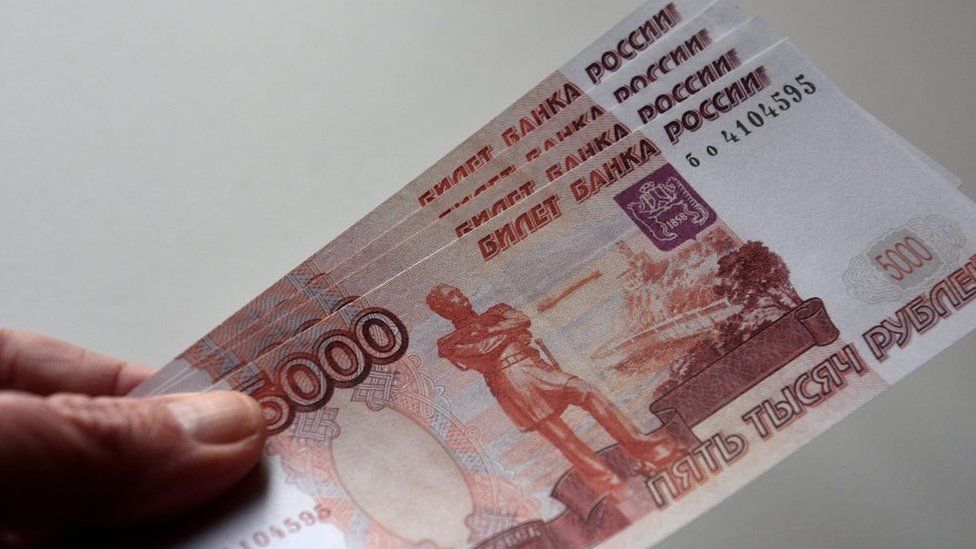ARTICLE AD BOX
 Image source, Getty Images
Image source, Getty Images
The Russian rouble has fallen to its lowest value for 16 months, falling past 100 per US dollar.
The decline comes as pressure grows on the Russian economy, with imports rising faster than exports and military spending growing for the Ukraine war.
Russia has been targeted with sanctions by Western countries following its invasion of Ukraine in February 2022.
The rouble plummeted after war first broke out, but was bolstered by capital controls and oil and gas exports.
It has fluctuated in value since the war, but has lost about a quarter of its value overall against the dollar since Ukraine was invaded.
Earlier on Monday, the rouble was 101.04 per US dollar. The more roubles per dollar means the currency is weakening, as it will take more of it to buy one US dollar, which is typically seen as the most powerful currency in the world.
Russia's central bank has said that a key interest rate increase is possible, but maintains that it sees no threat to the country's financial stability.
Jane Foley, managing director at Rabobank London, said the rouble had been "weakening progressively" this year, but added "the pace has picked up since late July".
"The weakness in the rouble reflects a weakening fundamental backdrop in Russia," she added, pointing out that the country's budget was in deficit and it was relying on imports from China and Turkey, but facing pressure over exports.
Russ Mould, investment director at AJ Bell, said that Russia's trade, and therefore its economy, was being hit by Western sanctions, "especially for oil and gas".
Since the outbreak of war, many EU countries which relied on Russian oil and gas have pledged to wean themselves off imports from the country and find alternative suppliers.
In December 2022, G7 and EU leaders introduced a price cap plan aimed at limiting the revenue Russia earns from its oil exports, by trying to keep it below $60 a barrel. This has played a part in the value of Russia's exports for oil dropping.
Russia also turned off the gas taps to Europe, leading to fears of blackouts. In January, Germany, once a large importer, said it no longer depended on the country's fossil fuels for its energy supply.
"Exports are down, so hard currency inflows are down, and imports are up, and even reliable trading partners such as China appear reluctant to take roubles," said Mr Mould.
He added Russia's exclusion from Swift, an international payment system used by thousands of financial institutions, had also hit Moscow.
But Mr Mould said that "rouble weakness must also be set against dollar strength", with the American currency "gaining ground against emerging currencies across the board".
He said this was partly due to the strength in the US economy, which he said "is forcing the Federal Reserve to raise interest rates in contrast to many emerging central banks, which are starting to cut (notably Brazil and Chile)".
"Higher returns on cash in dollars and lower ones in other currencies can increase the relative attractiveness of holding greenbacks, or assets denominated in them," Mr Mould added.
Ms Foley said there was speculation that Russia's central bank might increase interest rates in September to support the currency, after it slashed rates following the start of the war.

 1 year ago
36
1 year ago
36








 English (US) ·
English (US) ·